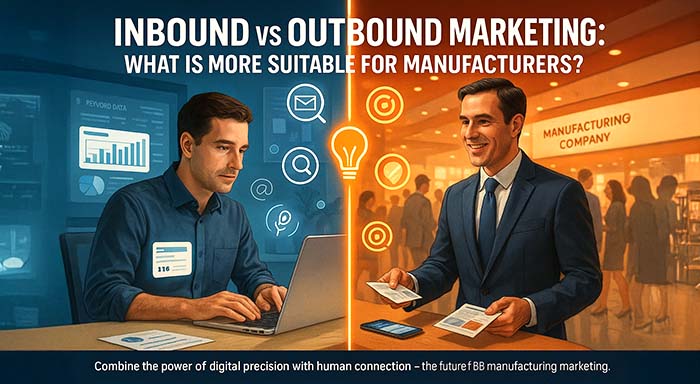When it comes to digital marketing strategies, some industries are more hesitant than others. One such industry is manufacturing. Even traditionally, original equipment manufacturers and B2B manufacturers have not made a solid reputation in the market for their robust marketing strategies. They depend on their sales team to drive their revenue, and the marketing team sort of takes a backseat.
Conventionally, the marketing team used to bear responsibility for presentations, proposals, and trade shows. However, digital marketing has emerged as a vital solution especially for SMEs to establish their presence in the market and generate leads. In the past decade or so, a few manufacturing companies have invested in digital marketing strategies and have seen measurable outcomes. In this blog, let us understand digital marketing for manufacturers. Let us proceed with our discussion by understanding the fundamentals first-
What Is Digital Marketing for Manufacturers?
First of all, let us clear up a misconception here. Often, marketers get confused with the term digital marketing and online marketing and often use it interchangeably. By technical definition, manufacturing digital marketing is a form of marketing in digital format. It can include innumerable things including social media, television, SEO, digital billboards, etc. An important point to note here is the fact that TV audience is a broad demographic to be relevant for B2B manufacturing industries.
In this context, digital marketing for manufacturers refers to the strategies and techniques related to the internet. It can include search engine optimization or social media, but not digital billboards and TV. Thus, for this blog, the term internet marketing and digital marketing can mean the same thing.
Do Manufacturers Even Need It?
While it is true that industries still need a fair amount of conventional marketing and sales tactics, the industry which is on the rise is digital marketing. Networking, trade shows, and word of mouth are still important for brand visibility. However, the manufacturers cannot ignore the potential of digital marketing strategies in growing their market. Nowadays, manufacturing customers increasingly need information which is available online. Technical buyers and young engineers prefer to visit a website rather than call a sales representative.
Digital marketing for manufacturing aids in making sure that you are visible to prospective customers online. Whenever your target customers search for any answers, solutions, or information, you are there to help them out.
What Are Outbound and Inbound Marketing?

In general, marketing can be divided into two broad categories: Inbound and outbound marketing.
Outbound Marketing
Outbound marketing refers to the strategy of pushing your reach and connecting with the audience that might align with your target customer profile. The outbound marketing techniques can involve the below-mentioned marketing methods:
- Digital display ad campaigns.
- Cold email campaigns.
- Radio/TV/Broadcast.
- Event & Sponsorships.
- Billboards and outdoor advertising.
- Print advertisement.
- Awareness activities and campaigns.
- Cold calling/Telemarketing.
- ABM (Account-based Marketing)
Inbound Marketing
Inbound marketing refers to finding people who are actively searching for what you have to offer. The tactic of inbound marketing involves the following marketing methods:
- Gated or educational content.
- Search engine optimization.
- Video content.
- Social media content & campaigns.
- Email/nurture campaigns.
- Search/PPC advertisement.
- Website content & articles.
- Webinars.
Inbound Vs Outbound Marketing: What is More Suitable for Manufacturers?
As far as B2B manufacturing companies are concerned, inbound marketing is more of a practical solution. Using inbound marketing, you can generate website content that is personalized uniquely to your customers’ requirements, pain points, and challenges. High-quality content can attract an audience to your website when they are actively searching for a solution. Irrespective of whether you are early on in the research stage or later in the buying cycle, engaging content creates foundations for future sales.
However, outbound marketing can also be a great complement to the above inbound marketing strategies.
For instance, trade shows can be a great strategy to spread awareness about your brand and products. However, you must have an online presence so that your booth visitors can look you up online. Robust inbound and outbound marketing strategies that complement each other can be a game-changing solution for manufacturing companies.
Read Also: Analyzingmarket .com: Most-preferred Platform for Market Analysis and Insights
What Are the Main Principles of Manufacturing Digital Marketing?
Manufacturing companies can follow the below-mentioned guidelines and concepts to formulate their marketing strategies:
Define customer profile: It is important to first define your high-level personas and ideal customer profile. In this way, you will be able to concentrate your efforts on those audiences who are more likely to purchase from you.
Target Specific Keywords: Manufacturing companies must focus on specific keywords that showcase great transactional intent. Even if they generate less volume of traffic, they are more valuable than terms that bring large and irrelevant traffic.
Set Remarketing for a Long Duration: They must reflect the long sales cycle for manufacturing and industrial companies.
Skew Your Audience: Target narrow audience and consider various factors such as time of day, buyer’s interests, demographics, geography, etc.
Concentrate on quality over quantity: If less traffic is reaching your website, it is absolutely fine if they are qualified ones. It essentially results in enhanced business outcomes.
Pay Attention to Your Website: Pay special attention to your website and get all the technicalities right. Before you start your SEO, PPC campaigns, or marketing on other channels, ensure that your website is robust and elegant.
What Are the Best Manufacturing Digital Marketing Strategies?
Let us understand the top 6 digital marketing strategies digital marketers can employ:
Search Engine Optimization:
For any business in any industry, SEO is of paramount importance. It can be regarded as one of the most fundamental digital marketing strategies. It essentially deals with ranking your website high in SERP results. Not only does SEO aid you in improving your market reputation, DA, DR, etc., through quality backlinks, but it also aids you in garnering more traffic. For many businesses, it is also an effective way to enhance the conversion rate. However, it is not the case in the manufacturing field.
Manufacturing companies need to play a long SEO game. You will have to slowly convince the customers and then lead them toward making a purchasing decision. You can design your SEO strategy like this: you can create top-quality content on a diverse range of topics. So, whenever your target audience searches for the topic, they see your brand. So, over time, they will build a perception that your brand has a certain level of expertise in the manufacturing field.
Essentially, SEO involves the below-mentioned elements:
- Finding high, moderate, or low-difficulty keywords to target clients who might be interested in your services or product.
- Design strategies that aid your content to rank for location specific keywords. For example, if your company is based in Pittsburg, then you can target keywords like “Manufacturing companies in Pennsylvania.”
- Creating top-level off page content to improve backlink profile as well as other website metrics like DA, DR, etc.
- SEO also involves focusing on on-page elements to ensure users get a decent user experience on the website.
PPC Campaigns:
Pay-per-click can be defined as an advertising model that enables you to set a precise budget and only pay an amount when visitors click on your ads. You can display PPC ads on third-party websites, search results, or on diverse social media channels. While choosing PPC services, manufacturing companies can make sure that you are maximizing the ad spending output and effectively connecting with the correct audience.
Keep in mind that PPC advertisements are always targeted. It means that it allows you to display your advertisement only to the chosen audience, i.e., an audience that is already looking for your services or products. Thus, it naturally gives you higher possibilities for clicks and conversions. In PPC ads, you can also target various demographics factors like age, occupation, location, etc.
This is precisely why PPC campaigns are so beneficial for manufacturing companies. The audience can change based on what you are manufacturing. However, manufacturing companies also have some common clients such as aerospace, construction, and agricultural companies. The PPC campaign gives you the option to connect with demographics that align with the company's decision-makers.
Web Design:
Web designing is one of the significant facets of growing the digital presence of your manufacturing company. The website design is the first thing that meets the eye of the user when they visit your website. In a way, it creates the first impressions users have of your website. Essentially, it must include a navigation bar that aids users to get around your website. The images must also be relevant, clearly visible, and visually captivating. Overall, the organization of the website must be neat.
It is also beneficial to include a testimonial section that involves reviews of customers raving about your product. Furthermore, it is also important to keep in mind that visuals play a huge role in convincing customers. Manufacturing companies must try to include as many images as possible of their manufactured products or parts. If you include mechanical or site components, then they must look neat and clean. Using a background remover tool can help ensure that your images appear professional and free of distractions.
You must also include shapes and colors that not only represent your brand but also the overall industry.
Social Media:
Social media is yet another interesting marketing tool to expand the footprints of your business. Essentially, it enables you to market your manufacturing brand to billions of brands on a daily basis. We now have a plethora of social media platforms to choose from such as Facebook, Twitter, Instagram, or LinkedIn. All of them enable businesses to share snippets, content, and important milestones of their business.
Thus, social media can become an intrinsic part of digital marketing for manufacturers, allowing them to share photos and updates with clients and prospects. For example, if you are a B2B manufacturing company, then there can hardly be a more relevant social media platform than LinkedIn.
Email Marketing:
Email marketing is one of the most cost-efficient strategies for boosting the reach and market position of your manufacturing company. Sending newsletters on a monthly basis enables you to engage with your existing customers and prospective clients. Furthermore, there might be some clients who need manufacturing services immediately. However, if you consistently engage them, your brand will be the first thing they will think about when they will actually need manufacturing services.
In the email newsletters, you can include vital details such as special offers, company updates, and details regarding your upcoming events and services.
Geofencing:
Geofencing is a crucial digital marketing strategy that involves establishing geographical boundaries surrounding your business location. Doing this allows users to automatically send notifications whenever they enter that boundary. There are numerous ways to setup geofencing as mentioned below:
- It is possible to establish geofencing through social media platforms.
- You can also do it with the help of an app if you have one.
- You can also utilize paid geofencing advertisements if you have one.
- Users also have the option of choosing paid geofencing advertisements within a certain geographical area.
Conclusion
Digital marketing for manufacturers is no longer a choice or a side-hustle; it is a core necessity to thrive in the competitive market. With growing competition in the market and evolving customer behaviors, manufacturing companies must utilize robust strategies to stay accessible and relevant. Ranging from SEO, PPC, email campaigns, to social media, such tools ensure consistent lead generation, visibility, and lasting customer engagement. Especially relevant for B2B manufacturing businesses, incorporating a comprehensive mix of outbound and inbound strategies can close the gap between conventional sales and modern buyer needs. By adopting robust digital marketing strategies, manufacturers can maximize their market footprint, develop trust, and drive great growth in a highly digitized economy.



